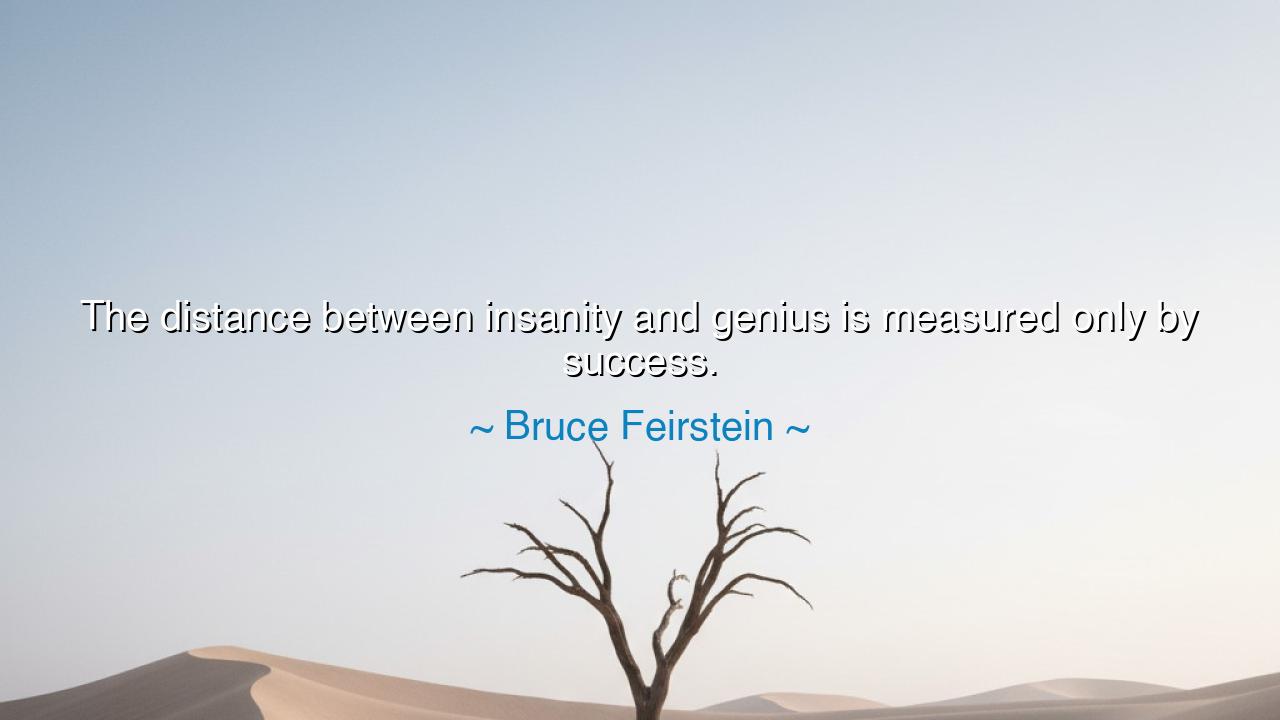
The distance between insanity and genius is measured only by






"The distance between insanity and genius is measured only by success." These words, spoken by Bruce Feirstein, offer a profound reflection on the nature of creativity, innovation, and the fine line that separates the misunderstood from the celebrated. What is perceived as madness by some can, with the gift of time and perspective, reveal itself as genius. And yet, the measuring stick between the two—success—is often a fleeting thing, shaped by the context of how the world receives a person’s ideas. Through this statement, Feirstein calls our attention to the reality that visionaries and pioneers often teeter on the edge of social acceptance, with their worth only fully realized when their ideas achieve success or recognition.
In the ancient world, Socrates might be seen as the embodiment of this fine line. To many of his contemporaries, his method of questioning, his constant probing of established truths, and his refusal to accept conventional norms would have seemed like insanity. Yet, Socrates believed his path was one of profound wisdom, a wisdom that came from continually challenging the assumptions of his society. Plato chronicled his master’s thoughts and methods, and in doing so, helped immortalize Socrates’ teachings. It was only through Plato’s success—his ability to carry Socrates’ wisdom into future generations—that the ideas which once seemed unhinged found their place in the foundation of Western philosophy. Thus, Socrates’ genius was only truly understood after he had long passed, and the success of his ideas was measured by how they influenced generations.
Consider the example of Galileo Galilei, whose groundbreaking work in astronomy revolutionized humanity’s understanding of the cosmos. Galileo was mocked and condemned by the Catholic Church, deemed insane for suggesting that the Earth orbited the Sun. His observations, which would later be confirmed as truth, were not recognized in his time but were instead dismissed as heretical and irrational. The success of Galileo’s ideas, however, was not measured until centuries later, when the evidence became undeniable. During his lifetime, he was seen as an eccentric at best and a dangerous radical at worst. His genius was misunderstood, only to be vindicated by the passage of time.
This theme continues with the story of Vincent van Gogh, whose work was considered insane by many during his lifetime. Van Gogh struggled with mental health and faced constant rejection, and his art was viewed as too strange, too wild, too far outside the norms of what people could comprehend. Yet, after his death, his work became some of the most prized and revered in the world. Van Gogh’s success, which eluded him in his lifetime, ultimately redefined the very nature of art and what is considered genius. The world’s acceptance of his work, and the resulting fame, ultimately revealed the wisdom and insight that were always present but not recognized in his time. His insanity, perhaps, was simply an inability to conform to the conventions of his era—a convention that could not yet understand the depth of his genius.
Through these examples, Feirstein’s quote teaches us that success—or lack thereof—often plays the determining role in how we categorize and judge visionaries and creators. The distance between genius and insanity is often a matter of perception—of how the world receives and evaluates new ideas. What is seen as madness today may be seen as brilliance tomorrow. It is the success of an idea—whether through recognition, acceptance, or practical application—that determines whether a person is remembered as a genius or dismissed as an eccentric.
The lesson here is that creativity, especially that which challenges established norms, requires courage. We must recognize that many of the greatest minds in history were often misunderstood in their time. Innovation is rarely embraced immediately, and those who dare to push boundaries may face rejection, criticism, and even exile. Yet, the true measure of their worth is not how society judges them in the moment, but how their ideas transform the world over time. Success is often the only factor that separates the perceived madness of a revolutionary thinker from the genius that will ultimately change history.
As we move through our own lives, we must be prepared to walk the fine line between visionary and outsider. We may be tempted to conform, to follow the established paths of safety and predictability. But true progress, whether in art, science, or society, often requires breaking away from the norms. Let us embrace creativity and vision without fear of being misunderstood, knowing that the true measure of our ideas will not be defined in the moment, but by the lasting impact they have on the world. And remember, that while success may seem distant, it is in the journey—in the relentless pursuit of ideas that challenge, inspire, and push boundaries—that we find our true legacy.






AAdministratorAdministrator
Welcome, honored guests. Please leave a comment, we will respond soon